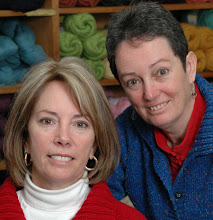1. Because cables pull in your fabric you will have to work a set of increase stitches in the round before setting up your pattern or in the first pattern row itself, before the first cable crossing. The rule is approximately 1 stitch increased for every 3 sts of a cable. A 6 stitch cable would need 2 sts increased. A 4 stitch cable would still require an increase of 2 sts. (See previous post: Cables, from Flat to in-the-round.)
2. This is a Top Down garment. You are knitting this garment upside down.
But when you wear it, it appears like this.
Oops, all of the good luck from your horseshoes is leaking out because now your horseshoes are upside down.
So although it will baffle anyone watching you, you need to look through your stitch dictionary with it turned UPSIDE DOWN. In that position you will see what the cable will look like when the sweater is worn. It's fun to do, especially in public.
3. Of course all the stitches in the cable are also turned upside down. This recent discussion prompted this response from LaurieofNepean:
"We are all so used to looking at a cable one way (as we knit it) and don’t always consider how different it looks when we turn it upside down. For example, the “v”s are not structured the way our eyes want them to look.
I have come to the conclusion that it’s the symmetry issue that affects many cable patterns when they are worked upside down. Even a 3x3 cable looks different upside down and right side up. So I always swatch before I put any pattern into my top-downs. Then I turn the swatch upside down and look at it carefully to decide if I like the look. This is a fairly recent development in my knitting career. It comes from seeing so many publications where the swatches are obviously photographed upside down and so look funny."
Thanks Laurie. Swatching, yes, great advice. You should definitely take a look at how the cable is going to appear upside down before embarking on a sweater.
Stay tuned for the next post for a couple of tips on "tells" so that your cable can't maintain it's poker face.
Previous Post: Cables, from Flat to in-the-round
Deb





very interesting about the upside down cable.
ReplyDeletevery informative, Deb.
t_a